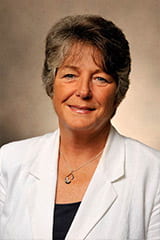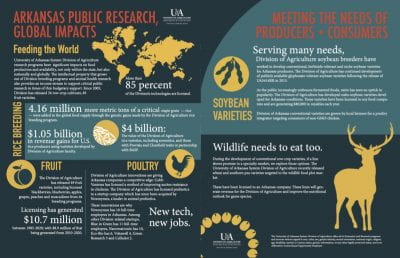Technology
Commercialization
The Technology Commercialization Office (TCO) commercializes world-class research to support a lasting knowledge-based economy to benefit Arkansas and the world. We help faculty and research scientists identify, protect, and commercialize intellectual property developed from their research or other university-supported activities.
The TCO is a part of the statewide University of Arkansas System Division of Agriculture.
TCO by the Numbers (2024)
U.S. Patents Issued
Active Licenses
Invention Disclosures
Licensing Revenue (FY2024)
Quick Information
Technology Commercialization Office
2549 N. Hatch Ave.
Fayetteville, AR 72704
Don Tyson Annex (DTAN) 9
Phone: 479-575-2608
Fax: 479-575-5717
Email: agritco@uada.edu
|
Lisa Childs |
Dr. Childs joined the University of Arkansas in 2006. As the Division of Agriculture’s Assistant Vice President for Technology Commercialization and patent attorney, she manages all aspects of the intellectual property portfolio for the Division of Agriculture. Dr. Childs practiced patent law as a partner in the Chicago office of Michael Best & Friedrich before joining the University, and is admitted to practice in Arkansas, Illinois, and the United States Patent and Trademark Office. She earned her law degree cum laude from Loyola University – Chicago School of Law; her Ph.D. in Genetics (plant molecular biology) from North Carolina State University; and her B.A. in biochemistry from Rice University. In her previous life, she worked on issues from forestry biotechnology to pet beds and jewelry settings. Dr. Childs would be a seventh-generation Arkansan, except that her parents moved to Oklahoma for technology-based jobs when they graduated from the University of Arkansas. Realizing this trend continues today, Dr. Childs is interested in making it easier for others to find technology-based jobs in Arkansas. |
||
|
Parker C. Cole |
Dr. Cole, Associate Director of Technology Commercialization, joined the Technology Commercialization Office in 2022. He is enthusiastic about technology transfer and entrepreneurial activities – promoting Division of Agriculture faculty and their inventions any chance he can. He was previously the Chief Scientific Officer (Biotechnology Strategic Business Unit) for Nanomatronix, LLC, located in Fayetteville, AR, where he worked on organ-on-chip technology, tissue engineering and novel in vivo models for immunology and toxicology; receiving over $2.5M in federal funding in his 7 years there. He also shared business development responsibilities for Nanomatronix’s nanotechnology and microelectronics units. Dr. Cole obtained a dual B.S. degree in Biochemistry and Biological Sciences with a minor in Business Management, and a Ph.D. in Biomedical Engineering from the University of Arkansas, Fayetteville. His graduate research focused on developing synthesis methodologies to create novel biomaterials for bone tissue engineering. During graduate school, he was fortunate to be a Doctoral Academy Fellow and an Inaugural Trainee in UA’s Professional Awareness, Advancement and Development (PAAD) Program, a National Science Foundation Research Traineeship. He and his wife, Claire, have one daughter, Aubrey. |
||
 |
Cheryl Nimmo Intellectual Property Fiscal Support Analyst Phone: 479-575-3953 Email: cnimmo@uark.edu |
||
|
Brandi Waters |
Brandi Waters joined the Technology Commercialization office in 2023. As Intellectual Property and Compliance Manager, she works to process and manage agreements with internal and external stakeholders, finalize invention disclosures from Division of Agriculture researchers, and manage IP portfolios for a wide range of licensed and unlicensed inventions. As a notary public, she is also available to notarize documents for Division of Agriculture employees. Brandi is a graduate of the University of Arkansas, Fayetteville, where she obtained a dual B.S. degree in Biochemistry and Microbiology. She has worked in a variety of science-focused roles, often working to communicate scientific terms, processes, or ideas to targeted audiences. Brandi is a registered patent agent, previously serving as the in-house patent agent for Process Dynamics, Inc. (now Duke Technologies, Inc.). She also serves as the President of Haas Hall Robotics, a non-profit founded to support robotics education at Haas Hall Academy and, through its outreach program, to promote and provide exposure to STEM fields to children in northwest Arkansas. Brandi and her husband, David, have two children, Oliver and Nora. |
||
Joint Patent and Copyright Committee
Board Policy 210.1 calls for UA – Fayetteville and the Division of Agriculture to form a joint committee to implement the University Patent and Copyright Policy for the Division and the Fayetteville campus.
| Name | Title | Term End | |
| Trenton Roberts | tlrobert@uark.edu | Committee Chair, Crop Soil & Environmental Sciences | 2028 |
| Ines Pinto | ipinto@uark.edu | Biological Sciences | 2024 |
| John Rupe | jrupe@uark.edu | Entomology and Plant Pathology | 2025 |
| Jake Grandy | jgrandy@uark.edu | Strategy Entrepreneurship & Venture Inn | 2025 |
| Emily McDermott | emcdermo@uark.edu | Entomology and Plant Pathology | 2027 |
| Jennifer Acuff | jacuff@uark.edu | Food Science | 2026 |
| Raj Raghavendra Rao | rajrao@uark.edu | Biomedical Engineering | 2026 |
| Roy McCann | rmccann@uark.edu | Electrical Engineering | 2026 |
| Susanne Striegler | sstriegl@uark.edu | Chemistry & Biochemistry | 2028 |
Frequently Asked Questions
This page is intended to provide useful reference information for some of the more common issues pertaining to technology transfer but does not provide definitive answers, as each situation is unique. Please contact our office for additional guidance.
How do I protect my intellectual property/invention?
The first thing that you should do is notify the Technology Commercialization Office. We will explain your rights and responsibilities as a University inventor, including the policy on sharing of royalty income. Download an Invention Disclosure Form
Will filing an invention disclosure impact my ability to publish?
Not much. Your prerogative to publish scholarly articles is paramount, and the Technology Commercialization Office will work with you to minimize the impact of disclosing your invention. Remember that your sponsored research agreement may have restrictions on publication and that untimely public disclosures can make it impossible to adequately protect your invention.
What is considered a public disclosure of an invention?
Anything that is readily available (a newspaper article, journal article, chalk talk, poster, web abstract) that describes the technology.
Will filing an invention disclosure protect my invention if I then publish?
No. The only thing that protects your invention is filing a patent application at the US Patent Office. Submitting an invention disclosure to our office is a useful step, but our office is not the same as the Patent Office.
Who owns patents at the University of Arkansas?
The Board of Trustees of the University of Arkansas.
What is the cost to the inventor to obtain a patent?
None. The University covers all patenting costs, in some cases in conjunction with the Research Sponsor or the licensee of the technology, if the Patent & Copyright Committee elects to take an assignment.
What does a patent cost?
Their costs vary, depending on the technology, the scope of the invention, and even the Patent Office examiners handling the case. Preparing and filing a relatively complex patent application costs $10,000 to $15,000. Subsequent negotiations with the Patent Office may cost another $10,000 (or more). The costs go up if we seek protection in other countries.
What is the life of a patent?
Typically twenty years, if all maintenance fees are paid, from the earliest filing date of a non-provisional utility patent application. Patent terms may be adjusted if the Patent Office takes longer to than normal to allow the patent to issue. Design patents are currently 14 years from the date they issue.
Does the University pursue foreign patents?
Yes, the University will occasionally pursue patents in foreign countries if warranted by commercial opportunities.
Will I get any money if the University succeeds in getting my invention commercialized?
Yes. Under Board Policy 210.1, the University generally shares its revenues with the inventors of the technology.
For most inventions, the inventors receive half of the first $200,000 in net revenues, and 35% thereafter. (Net revenues are defined by this Board Policy, but generally, are the revenues received by the University, less the costs of patenting or copyright, licensing, and other costs directly related to commercialization.)
For the plant breeding programs (inventions involving new or improved cultivar development and release for commercial or private cultivation), the inventors receive 35% of the first $200,000 in net revenues and 25% thereafter.
May I license my own invention from the University?
Yes, provided that you can show that a licensing arrangement with you or your company provides the University favorable prospects to commercialize the technology, and subject to University conflict of interest policies.
Does the University have an ownership interest in intellectual property if I am consulting for a third party? Must such intellectual property be disclosed to the University? May such intellectual property be assigned by the faculty member to the third party, rather than to the University?
Board Policy 210.1 requires that any invention by a faculty member must be timely disclosed to the University, regardless of whether it occurs at a time that you are not on University appointment, and regardless of any contrary contractual obligations imposed by a third party, unless a specific agreement to the contrary has been negotiated in advance with the University.
If the University determines that the invention is unrelated to the activities for which the faculty member is employed by the University and it was not made or conceived under circumstances involving University facilities or personnel, then the University will make no claim to such invention. For example, if an invention arises directly out of consulting activity paid for by the third party and is exclusively based on nonpublic information provided by the third party (rather than on University Research), then the University will not assert an ownership interest in the invention.
What is the meaning of “independent work or permissible consulting activities” in Board Policy 210.1.E.2, regarding the assignment of intellectual property rights to third parties?
This phrase relates to inventions and patents (1) that are unrelated to University Research (“independent work”) or (2) to consulting activities which have been specifically disclosed to the University and authorized in writing, including approval of any conflict management plan which may be required (“permissible consulting activities”).
If I am a student at the University of Arkansas and I invent something, create software, or develop some other scholarly work, must I submit an invention disclosure or university works disclosure?
No. If the intellectual property you develop was solely developed by you or you and other student collaborators, then the invention or work belongs to you. However, if you have a co-inventor or co-developer that is a University of Arkansas faculty or staff member, they must submit an invention disclosure or university works disclosure and must include you as a co-inventor or co-developer. Also, if your work was funded under a sponsored research agreement, there may be contractual obligations that require you to disclose your invention to the University.
If I am not required to submit an invention disclosure or university works disclosure because I am a student or not affiliated with the University, may I choose to submit one voluntarily?
Yes. If you’d like to submit your invention, software, or other scholarly work to be considered for University of Arkansas assignment, you may do so.
If you elect this scenario, we will present your intellectual property to the University of Arkansas Patent & Copyright Committee. If the Committee elects to take assignment, then we will work to commercialize your invention. If we succeed, you will be treated like any other person under Board Policy 210.1, and will receive a share of the net revenues.
- Board Policy 210.1 (PDF)
- Board Policy 210.2 (PDF)
- Invention Disclosure Form (DOC)
- Understanding the Basics of Patenting
- University Works Form (DOC)
Inventors can help make the environment cleaner, workplaces safer, crops more abundant, foods tastier, and humans and animals healthier. The Technology Commercialization Office (TCO) welcomes the opportunity to contribute to the ‘innovation through commercialization’ process by facilitating a return on the investments the public, the University’s Division of Agriculture, and individual scientists and engineers have made in advancing knowledge.
The formal university-industry technology transfer process starts with a disclosure. Faculty, staff, and students are asked to submit invention disclosures to the TCO using the forms that are available above. Someone from our office will consult with you to learn more about your invention. We will then present your invention to the Patent & Copyright Committee. The committee will review the disclosure and make a recommendation to the Vice President for the Division of Agriculture.
The more detailed the description of the invention and its advantages related to prior technology (faster, cheaper, stronger), the better placed the Committee is to decide whether or not to invest additional University resources in the protection (usually via patenting), marketing, and licensing of the underlying intellectual property. Please write the disclosure in full, clear, and exact terms as to enable any person skilled in the relevant field to make and use the invention. Patent law requires that the specification set forth the precise and best mode of the invention in a manner that distinguishes it from other inventions and what is currently known and practiced. Also, be bold about listing potential applications in other fields.
Let’s work together to realize the benefits of your invention.
For more information please visit our FAQ tab.
Frequently Asked Questions: This page is intended to provide useful reference information for some of the more common issues pertaining to technology transfer but does not provide definitive answers, as each situation is unique. Please contact our office for additional guidance.
Inventor Forms and Resources
- Board Policy 210.1 (PDF)
- Board Policy 210.2 (PDF)
- Invention Disclosure Form (DOC)
- Understanding the Basics of Patenting
- University Works Form (DOC)
U of A
- U of A Division of Agriculture
- U of A Fayetteville, Technology Licensing Office(Technology Ventures)
- UAMS Technology Licensing Office
- Arkansas Research & Technology Park
- U of A Fayetteville Research & Economic Development
- U of A Fayetteville Research Support and Sponsored Programs
- U of A Experts
- ScholarWorks
State Research & Development
- Arkansas Small Business Development Center
- Arkansas Science and Technology Authority
- Arkansas Economic Development Commission
- Questionnaire for Would-Be Arkansas Entrepreneurs
Intellectual Property and Commercialization
- IP Awareness Assessment Tool
- Campus Copyright Rights and Responsibilities: A Basic Guide to Policy Considerations
- Code of Best Practices in Fair Use for Media Literacy Education
- Google Patent Search Engine
- Google Scholar Search Engine
- USPTO Patent FAQ’s
- U.S. Copyright Office
- U.S. Patent and Trademark Office
- Association of Univ. Technology Managers (AUTM)
- Intellectual Property (Council on Government Relations)
- SBIR Gateway
- Intellectual Property (IP) Identifier




